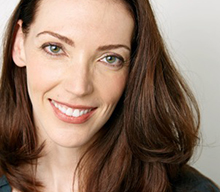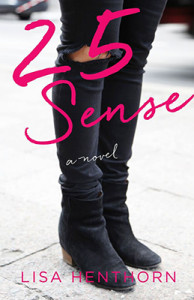
As a television writer and published author of 25 Sense, Lisa Henthorn brings a very unique writing experience to the industry. Here, Lisa shares a bit about her transition into writing her novel from her television writing experience.
I love to write. It’s really the only thing I’ve been one hundred percent certain about my entire life. The only thing I wasn’t certain about was how I was going to turn that love of writing into a career. I majored in English literature and creative writing in college, but I wasn’t sure what direction to head in when I graduated. Up until then, picking one writing field from another felt like deciding which one of my children to save. My first thought was to go into academia, so I started researching graduate schools, and mostly by chance, came across a MFA screenwriting program. Hmmm. Screenwriting? That sounded interesting. I emailed the head of the department and five months later, I walked into my first class, having very little knowledge about the field other than it involved movies and television.
Screenwriting was a fascinating new world to me. As a screenwriter, you communicate the story directly through your characters, either by their dialogue or their physical action. It requires you to think about your story visually. For television show, which was what I gravitated towards, there is a set structure you must keep (hour long episode, act breaks for commercials) which teaches you to be very economical with your words. There are budgetary issues to keep in mind, because everything you write costs money to actually produce (sets, location shoots, actors, etc.). These all sound like constraints, and they are, but there was a unique satisfaction I found in finding ways to be creative within those boundaries. Near the end my first year at the MFA program, I asked my graduate advisor, himself a former television writer, if he knew anyone looking for a summer intern in Los Angeles so I could actually see what working on a television show was like. A few days later, he had found me a position on a CBS show. I packed my things, drove to LA, and never left.
I eventually worked my way from being the assistant to a writer to being an actual writer on staff. And it was fantastic. I was spending my days sitting in writers’ rooms, debating and discussing characters and story and motivations and plot… and for anyone who loves writing, it’s easy to imagine why I was so happy. I was living my dream.
But after a few years, as much as I loved the incredibly talented and intelligent people I worked with, my writing wasn’t feeling as personally rewarding as it once had. I began to miss the freedom of prose and the ability to make deep dives into character’s thoughts without having to make them visual. I missed the luxury of focusing solely on one protagonist’s journey. I didn’t want to worry about making an act break a cliffhanger so that the audience would return after the commercial break. I was also working on shows that other people had created, which meant I was doing my best to fit my voice into the voice of the show that I didn’t always have a personal connection to. The very constraints that I had found appealing years earlier began to seem less appealing, and I felt terrible about it. Had I pursued the wrong path? Was my initial attraction to screenwriting misjudged? How could I have worked so hard to get where I was and now not be sure that was were I belonged? I still had love for television, but I wasn’t sure I was IN love with television, and I needed to find a way to express myself in another form as well… before writing became just a job rather than a passion.
After more than a few sleepless nights, it hit me. That book I had started…
You see, years earlier, I had been involved in an ill-advised affair with my boss. Not my finest moment, to say the least. I was 25 years old and in love, which, when you’re 25, is the ultimate justification for bad behavior. When it predictably ended, I was emotionally wrecked. To help me cope, I began to write a fictionalized version of the affair. It was cathartic and freeing and it really helped me recover. The rough manuscript had sat on my computer for five years at this point, so I buckled down to finish. Once it was done, I sent it to a trusted friend who encouraged me to get it out in the world. That’s how my first novel, 25 Sense, came to be.
I couldn’t be more excited to start this journey into the world of fiction. And, surprisingly, I’ve also found myself more and more excited about writing for television again. I guess, as writers, we all have different creative needs at certain points in our life, and the challenge is to listen to those needs and don’t be afraid to try something new and out of your lane. Sink or swim, to quote the great Nora Ephron, everything is copy, right?
 Lisa Henthorn is a television writer who wrote on the CBS show Swingtown, the CW show The Beautiful Life, and the A&E show The Glades. She lives in Santa Monica, California with her husband.
Lisa Henthorn is a television writer who wrote on the CBS show Swingtown, the CW show The Beautiful Life, and the A&E show The Glades. She lives in Santa Monica, California with her husband.

About 25 Sense
Claire Malone didn’t mean for this to happen when she moved to New York. She just wanted to live the city life and gain experience in television writing, her dream career. It’s not like she meant to reciprocate when her married boss, Sean Vared, sent her flirty e-mails. And you can’t blame her for coming into the office on the weekend when Sean told her he was going to be there . . . alone. She didn’t mean to sleep with him—but hey, she wanted to experience the city life, so no big deal, right? Wrong. By the time Claire wakes up on her 25th birthday, she’s very much in love with Sean. At work, she struggles to hold it together when he passes her desk—the very desk that they used to make love on. Soon Sean has turned his affection to the show’s starring actress, and Claire is devastated. Can she break away from Sean without ruining her barely started career? Will someone find out what happened? Will she ever grow up and stop making stupid mistakes? 25 Sense is about the time in a young woman’s life when the world starts to view her as a responsible adult—but all she feels is lost.


Leave A Comment